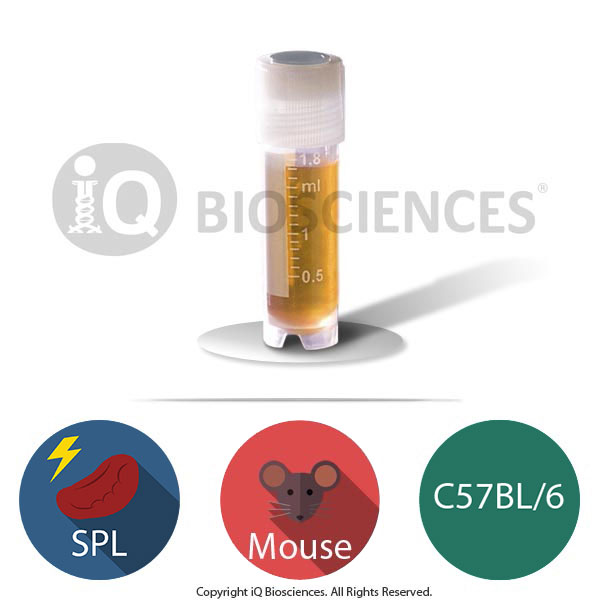[IQ Biosciences] C57BL/6 Mouse Irradiated Splenocytes

SKU: IQB-M2-S25R
- High-quality irradiated splenocytes from the C57BL/6 mouse, the most commonly-used inbred mouse strain
- Used for a wide variety of immunology-based applications, including proliferation and cytotoxicity studies
- All orders come with an iQ Certificate of Analysis
- Normally ships out same business day
About the C57BL/6 Mouse
The C57BL/6 mouse is the most commonly-used inbred mouse strain available and is employed in numerous research areas, including immunology, genetics, diabetes and obesity, neurobiology, cardiovascular biology, and developmental biology. They are routinely used as the background strain for generation of congenics carrying modified genes and/or transgenes. These mice carry the H-2b haplotype and their immune cells are commonly used in immune-based assays. Further, the C57BL/6 mouse is biased towards a Th1 cell-mediated immune response when challenged appropriately. Together, the C57BL/6 mouse has been extensively used to study numerous scientific questions and their cells (like these C57BL/6 mouse splenocytes) may offer many experimental benefits depending on the parameters of your experiments.
Application Summary for C57BL/6 Mouse Irradiated Splenocytes
Irradiated mouse splenocytes can be used as antigen presenting cells, stimulation/feeder cells or target cells in a wide variety of immunology-based applications. Unlike unirradiated cells, these cells will not divide or respond to stimulus. However, the antigen presenting cells found in the splenic population, such as dendritic cells, macrophages, and B cells, can present antigenic peptide to stimulate exogenously added CD4 and CD8 T cells, such as those from T cell receptor (TCR) transgenic mice whose T cells bear only one TCR of known specificity. In these types of co-culture studies that require antigen presentation, peptide is added to the irradiated cells, which present the peptide to activate the T cells to produce cytokine, proliferate, and perform cytotoxicity on the irradiated cells.
Irradiated splenocytes can also be used as stimulator cells in mixed lymphocyte reactions (MLR). In these type of experiments, the irradiated cells and exogenously added effector cells, which are typically T cells, are of different genetic backgrounds, in particular, they are of different MHC haplotypes. The effector cells will respond to the difference in the MHC haplotype and begin to produce cytokines, proliferate, and perform cytotoxicity.
Isolation of Splenocytes
Spleen Collection and Splenocyte Isolation
Spleens are isolated responsibly from C57BL/6 congenic mice at third party facilities. These facilities are vetted to ensure they operate according to local regulations and laws. Since the facility is local, the tissue is quickly transported to iQ’s facility for processing.
Once at our facility, the splenic tissue is carefully dissociated through a gentle mechanical process to generate a single cell suspension under sterile conditions. The suspension is then carefully passed through a filter to remove any fat and/or connective tissue and subsequently depleted of red blood cells in a manner that is not damaging to the other cells. The purified splenocytes are then frozen based on iQ Biosciences’ quality-controlled cryopreservation protocol to promote recoverability and viability once in the end user’s hands.
Irradiation of Splenocytes
After isolation of the splenocytes, the cells are irradiated using X-ray radiation at a dosage that stops cell division, but permits retention of cellular processes, including antigen processing and presentation. The irradiation is performed at a world class institution that abides by state and federal regulations regarding radioactive usage.
Cryopreservation and Storage
Our C57BL/6 mouse irradiated splenocytes are cryopreserved carefully using iQ Biosciences’ cryopreservation protocol that ensures high viability (typically > 70%) after thawing.
Cells should be stored at < -120°C once they are received, such as within a liquid nitrogen tank (vapor phase).
| 25 million cells / vial, 5 million cells / vial |
| Splenocytes |
| Frozen |
| Mouse |
| Spleen |
| Typically > 70% |



